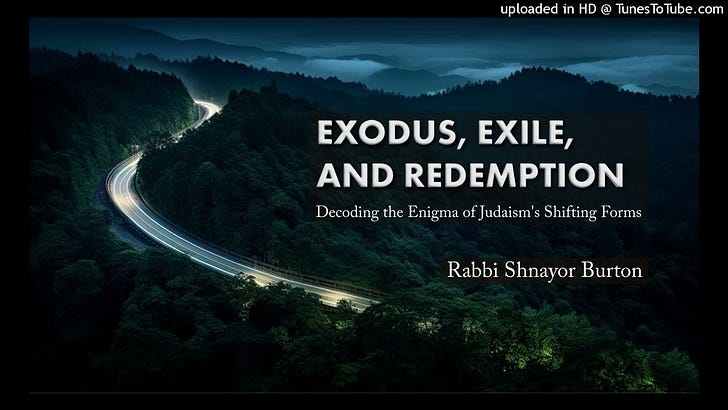EE & R, 3_19: Between the Torah and the Prophets: Avraham’s Doubt and the Path of Torah
← Prev | Table of Contents | Next →
3. Between the Torah & the Prophets – Can Man Truly Know Hashem?
Hashem’s response to Israel’s inexplicable suffering points back to His earlier revelation to the Patriarchs – Avraham, Yitzchak and Yaakov – the great founders of the Path of Unknowing that Moshe was now being summoned to follow:
I am Hashem. And I appeared to Avraham, to Yitzchak and to Yaakov as El Shaddai, but by my Name, Hashem, I was not known to them… (Exodus 6:2-3)
We now retrain our focus on the forefathers of Israel to further illuminate the foundations of the Torah. We begin with Avraham and Yaakov, both of whom encountered Hashem by His Name, only to respond with an expression of unknowing. As is written:
And He said to him, “I am Hashem who brought you out of Ur of the Chaldeans to give you this land to possess it.” And he said, “Lord Hashem, how can I know that I will possess it?” (Genesis 15:7-8)
And he dreamed, and behold, a ladder was set up on the earth, and the top of it reached to heaven… And behold, Hashem was standing above it, and He said, “I am Hashem… the land on which you lie, to you I will give it and to your seed” … And Yaakov awoke from his sleep and said, “Indeed, Hashem is in this place, and I did not know” (ibid., 28:12-16)
Avraham’s question – his admission of unknowing – is met with knowledge. He is made to know the certainty of his descendants’ suffering:
Know well that your seed will be strangers in a land not theirs, and they will be enslaved and afflicted for four hundred years (ibid., 15:13).
This dire decree was the consequence of Avraham’s deficiency in Knowledge. As Chazal teach:
Why was our forefather Avraham punished with the enslavement of his children in Egypt for 210 years? Because he pressed the attributes of the Holy, blessed be He, as is stated: “How can I know that I will possess it?”1
Avraham questioned the divine attributes – the ways in which Hashem reveals Himself to man – seeking a deeper certainty than what he had been given. He pressed for a state of enlightenment beyond the knowledge that had been offered to him, insisting that Hashem’s self-introduction to him by Name was insufficient to redeem him from unknowing. For the sin of pressing too far, he was punished with knowledge: the knowledge of suffering and bondage.
Yet this suffering is not a punishment in the conventional sense. It is simply the natural result of unknowing – for those who do not know Hashem are condemned to suffer senselessly, to experience the world as arbitrary and chaotic. So too the Jewish people suffered under Pharaoh, who, when confronted by Moshe’s demand to act justly and release them, replied: “I do not know Hashem” (Exodus 5:2).
But we can press even further. The reference to the forefathers’ unknowing in the context of their descendants’ suffering marks the beginning of the Mosaic path – the Torah’s unique and radical teaching that man cannot truly know Hashem. From this perspective, Avraham’s question, “How can I know?” is not a failing, but the articulation of a sublime truth: Man cannot know.
Hashem’s self-introduction by Name is, in the end, a paradox, an offering that both reveals and conceals. What is considered a sin by the prophets, whose doctrine centers on the possibility of divine knowledge, becomes a merit in the deeper teaching of Moshe: the Torah of holy unknowing.
In light of this most profound truth, suffering is not punishment – it is the very path to the highest understanding. For in the Torah's world, the pinnacle of human comprehension is holy ignorance.
From this perspective, we might rephrase the teaching of Chazal as follows:
Why was our forefather Avraham rewarded with the enslavement of his children in Egypt for 210 years? Because he pressed the attributes of the Holy, Blessed be He, as is stated: “How can I know that I will possess it?”
Bondage, exile and senseless evil served to initiate the path of the Torah – the path of Unknowledge first anticipated by the great Avraham. He expressed doubt regarding possession of the Land, the gift pledged to his descendants as the basis for a political order rooted in knowledge of Hashem.2 And this doubt, rooted in the higher truth of unknowledge, precipitated estrangement from the Land and exile “in a land not theirs” – in Egypt.
The first patriarch was no ordinary prophet imparting knowledge, but rather a forerunner of the greatest of all prophets. Avraham’s relationship with the divine laid the foundation for Moshe's doctrine of unknowledge.
Yaakov, too, was no ordinary prophet. Just as Avraham’s question led to the purposeful exile, Yaakov’s struggles reveal another dimension of divine obscurity. He himself was repeatedly and harshly criticized by the prophets for his elusive nature and morally ambiguous conduct, as we have seen.3 Yet these criticisms must now be reexamined in light of the Torah’s path of unknowledge.
This will be the subject of our next chapter.


